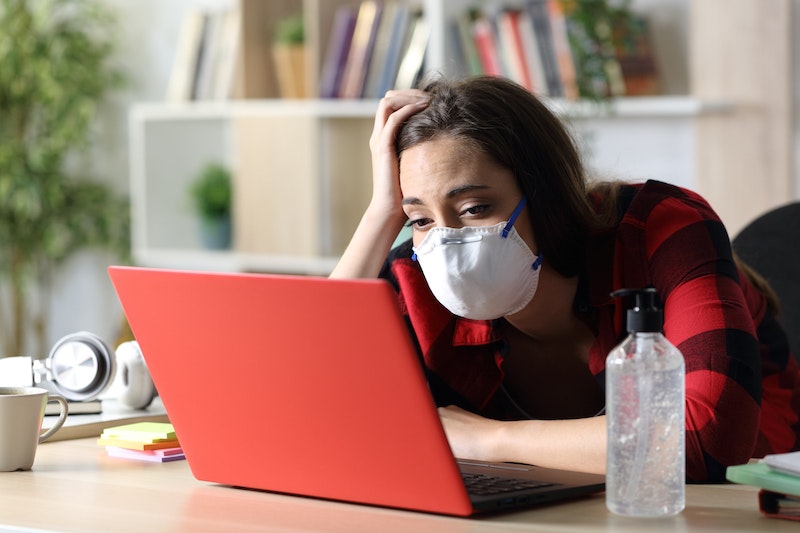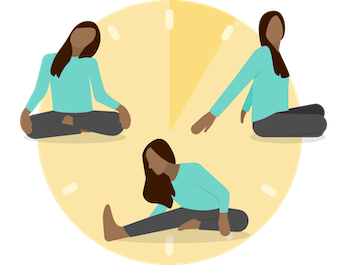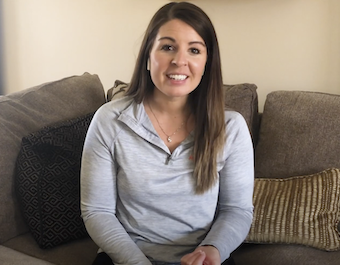It's now been about a year since the COVID-19 pandemic disrupted our lives with a cascade of stay-at-home orders and other restrictions. Whether or not you were among the millions of Americans who contracted the virus, you've undoubtedly been through some turmoil. Maybe you lost a loved one, lost a job, or struggled to support a child whose classroom went virtual. Perhaps you haven't seen extended family in ages. You might have missed out on important milestones, like a friend's wedding, or the funeral of a loved one.
Not surprisingly, health experts around the world have seen a drastic uptick in depression and anxiety disorders since the pandemic began. Living through the past year has been “chaotic and scary” for everyone, says Laura Boxley, PhD, a neuropsychologist in the Department of Psychiatry and Behavioral Health at The Ohio State University Wexner Medical Center. “You’d have to be a machine not to take some of that on.”
Even if you don't meet the criteria for a mental health condition, being constantly stressed has real consequences. “When the body gets stressed it secretes immune-modulating chemicals, the big ones being glucocorticoids” like cortisol and adrenaline (epinephrine), says Robert M. Cole, MD, assistant professor of medicine at Cooper Medical School of Rowan University and ICU clinical site director. This rush of hormones kicks your “fight or flight” instinct into gear.
In the short term that’s helpful, because it enables you to focus on a pressing threat. When your body stays stressed, however, bad things start to happen. “Every single organ system is going to be affected,” says Cole.
Being under constant pressure can take a serious toll: Not only can relentless stress make you feel lousy, but it can predispose you to diabetes by causing insulin resistance and raise your heart attack and stroke risk by making your blood more apt to clot.
Is your body paying the price? If you haven’t been proactively taking steps to manage your stress, it may be. Here are some subtle (and not so subtle) ways your body might be telling you need a break from stress.
Your stomach hurts.
When the sympathetic nervous system (which controls your stress response) remains activated, “it increases inflammation and shunts blood away from your gut over to your muscles,” says Wayne Jonas, MD, executive director of Integrative Health Programs at the Samueli Foundation and clinical professor of Family Medicine at Georgetown University. The result is that food isn’t digested properly, which can lead to diarrhea, constipation, acid reflux, or other GI issues.
You’re always exhausted.
Stress certainly makes it difficult to sleep soundly, but ongoing exhaustion could also be a sign of clinical depression or anxiety. And while social distancing and mask-wearing hopefully mean that you’re not frequently catching colds, persistent fatigue might mean that your immune system has been compromised. “We know without a doubt that stress causes dysfunction to your immune system,” says Cole.
You’re getting lots of headaches.
You’re stressed out, not getting enough rest, and maybe clenching your jaw or sitting with your shoulders tensed up — no wonder your head hurts! Stress is most apt to cause tension-type headaches, which feel like your head is in a vise. The higher your stress level, the more frequent these headaches are apt to be.
Stress is also a trigger for many people who suffer from migraines, which can be both long-lasting and debilitating.
You’re gaining weight.
If you’re spending more time at home you may be snacking throughout the day, but there are also physiological reasons why you might have put on the “quarantine 15.” Research has found that women who were stressed burned 104 fewer calories in a day compared to those who weren’t under emotional pressure. That could translate to almost 11 pounds over the course of a year.
Also concerning: People who have chronically high levels of the stress hormone cortisol tend to have more abdominal fat (visceral fat), which is the kind most closely associated with an increased risk of cardiovascular disease and diabetes.
Getting stress in check
While the effects of stress can be harmful, you aren’t doomed. A lot of the power to control how stress affects you is in your hands. Taking some specific steps can go a long way:
Allow yourself to grieve.
While endless wallowing isn’t healthy, neither is pretending to ignore your losses — however big or small they may be. Working through your anguish with a therapist might prove helpful, but in some cases it’s enough to connect with a like-minded group of people (perhaps through an online support group), says Wisconsin-based psychotherapist Teralyn Sell, PhD.
Dial down the news.
The constant stream of upsetting news can become overwhelming. “Instead of checking it all day long, pick one time a day or even one time a week to catch up,” suggests Sell. Otherwise, “Binge watch something fun! Choose bubble gum for the mind if that’s what you need.”
Move more.
Exercise, especially the aerobic kind, decreases levels of stress hormones like cortisol and adrenaline. Also worth exploring: slower, more gentle forms of exercise like tai chi and yoga, which combine mindfulness practices with movement, says Jonas, author of How Healing Works.
Limit alcohol.
An occasional beer or glass of vino might help you relax, but frequently turning to alcohol instead of finding healthier ways to cope could ultimately make you more stressed and emotional. Alcohol can also harm the quality of your sleep so you feel more frazzled the next day.
Scale back on caffeine.
Caffeine increases both cortisol and epinephrine, so it might be stressing you out more than you realize. Try cutting back if you’ve been having trouble sleeping, getting headaches, or just feeling anxious.
Give meditation a go.
When you’re chronically stressed, the left frontal lobe of your brain actually shrinks and becomes more apt to send signals to your amygdala that prompt you to panic, says Jonas. But if you “exercise” it by practicing deep relaxation, the frontal lobe will grow. “I recommend 20 minutes a day, but even 5 minutes can make a difference,” he says. You can find a variety of guided relaxation exercises online.
Touch base with your primary care provider.
Not having a trusted provider you can turn to, especially during a pandemic, can be anxiety-provoking, says Boxley. “You want to establish a relationship with someone who really knows you, can answer your questions, and can monitor your health.” An internist or family care doctor can also help you sort out whether any symptoms you’re having are truly due to stress or whether an underlying ailment might be to blame. And more and more practices are offering virtual visits, so you may be able to check in without going in.
Know when to seek help.
Everyone gets stressed, but persistent mental health struggles shouldn’t be taken lightly. If you have symptoms that are interfering in your ability to perform daily tasks, or you’re overwhelmed by thoughts of sadness or worthlessness, it may be time to seek help. If you have contemplated hurting yourself, the National Suicide Prevention Lifeline has caring, trained counselors available 24/7 at 1-800-273-TALK (1-800-273-8255). Call 911 if you or someone else is in immediate danger.
If you can’t see a mental health provider in person because of the pandemic, consider teletherapy. It can be more convenient yet just as effective –– as long as you find the right therapist, says Sell.
BARBARA BRODY
Rally Health






